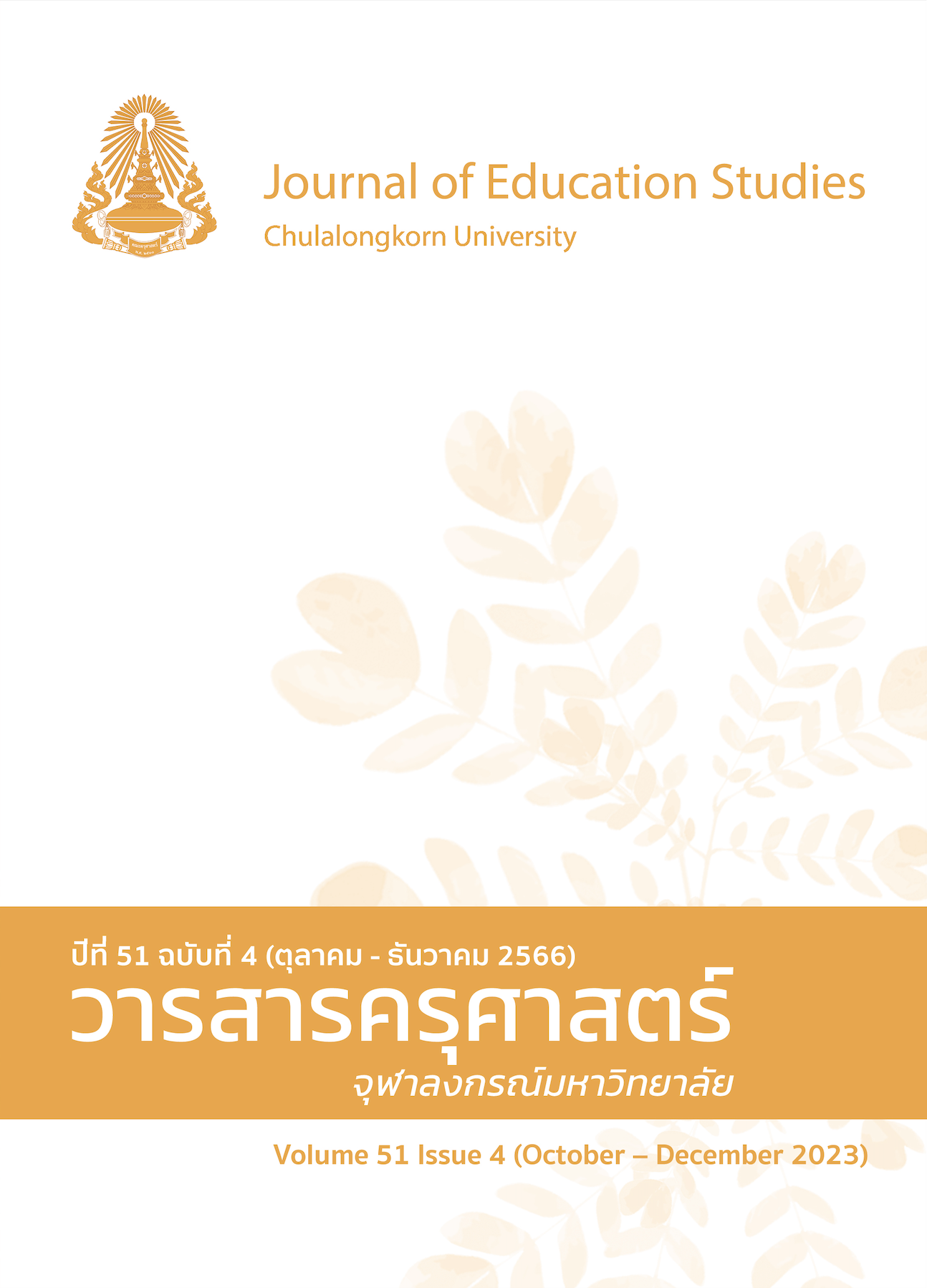A Mixed-Method Study of Music Playing-Related Injuries in Secondary School Band Students: A Case Study from Schools in Bangkok
A Case Study from Schools in Bangkok
DOI:
https://doi.org/10.14456/educu.2023.31Keywords:
Music playing-related injuries, Music student, Marching band, Secondary School, music practiceAbstract
Musculoskeletal injuries are commonly found among both professional and student. This mixed-method study will address the survey of self-reported injuries among student in secondary school bands in Bangkok. A convergent design was used to collect data for this study, in which the participants were 117 instrumental and marching band students. A questionnaire and semi-structured interview on perceived musculoskeletal injuries were administered. Descriptive statistics and content analysis were used to analyze the data. The results showed: 1) Physical preparations were used sparingly (moderate and low level) during pre and post rehearsal time. 2) During normal times, rehearsal was conducted five days a week and took one to three hours per day; however, during the competition weeks, rehearsal sessions recurred daily and lasted longer than eight hours. There was a positive correlation between rehearsal days and the frequency of student injuries at .05 (r=.191, p=.03). 3) 88.0% of secondary school band students had experienced injuries, the most common of which were to the shoulders, lips, neck, and hands; and 4) injuries can be classified into three types: poor posture, overuse, and a lack of physical preparation.
References
ภาษาไทย
ฌานดนู ไล้ทอง. (2560). ผลการใช้ชุดแบบฝึกตามแนวคิดของคาร์ล ออร์ฟเพื่อพัฒนาความเข้าใจทางด้านจังหวะ
ของนักเรียนวงโยธวาทิตระดับประถมศึกษา [วิทยานิพนธ์ปริญญามหาบัณฑิต ไม่ได้ตีพิมพ์]. จุฬาลงกรณ์มหาวิทยาลัย.
วิทยาลัยดุริยางคศิลป์ มหาวิทยาลัยมหิดล. (2561). หลักสูตรดุริยางคศาสตรบัณฑิต (หลักสูตรปรับปรุง 2561).
วิทยาลัยดุริยางคศิลป์ มหาวิทยาลัยมหิดล.
สถาบันดนตรีกัลยาณิวัฒนา. (2562). หลักสูตรดุริยางคศาสตรบัณฑิต (หลักสูตรปรับปรุง 2562). สถาบันดนตรี
กัลยาณิวัฒนา.
ภาษาอังกฤษ
Beckett, S., Seidelman, L., Hanney, W. J., Liu, X., & Rothschild, C. E. (2015). Prevalence of
Musculoskeletal Injury Among Collegiate Marching Band and Color Guard Members. Medical problems of performing artists, 30(2), 106–110. https://doi.org/10.21091/ mppa.2015.2018
Florida Bandmasters Association. (2023, September 29). Starting Beginning Band Members:
A Three-Part Series: Part 3, Establishing a Balanced Instrumentation.
https:// fba.flmusiced.org/for-directors/mentoring/starting-beginning-band-members-part-3-balanced-instrumentation/.
Gasibat, Q., Simbak, N. B., & Aziz A. A. (2017). Stretching exercises to prevent work-related
musculoskeletal disorders – a review article. American Journal of Sports Science and Medicine. 2017, 5(2), 27-37. DOI: 10.12691/ajssm-5-2-3.
Kilanowski, J. F. (2008). Marching athletes: Injuries and illnesses at band camp. MCN.
The American Journal of Maternal Child Nursing, 33(6), 338-345. https://doi.org/10.1097/01.NMC.0000341252.95674.9f.
Klickstein, G. (2009). The musician’s way: A guide to practice, performance, and wellness. Oxford.
Maric, D., Stojic, M., Dusan, Maric, M., Susnjevic, S., Radosevic, D., and Knezi, N. (2019). A Painful
symphony: The presence of overuse syndrome in professional classical musicians. International journal of morphology. 37. 1118-1122. 10.4067/S0717-95022019000301118.
Mehler, A. S., Brink, D. S., Eickmeier, K. M., Hesse, D. F., & McGuire, J. W. (1996). Marching band injuries. A one-season survey of the University of Michigan marching band. Journal of The American Podiatric Medical Association, 86(9), 407–413. https://doi.org/10.7547 /87507315-86-9-407.
Rousseau, C., Barton, G., Garden, P., & Baltzopoulos, V. (2021). Development of an injury
prevention model for playing-related musculoskeletal disorders in orchestra musicians based on predisposing risk factors. International Journal of Industrial Ergonomics, 81, 103026. https://doi.org/10.1016/j.ergon.2020.103026.
Savvidou, P. (2021). Teaching the Whole Musician: A Guide to Wellness in the Applied Studio. Oxford.
Silva, F.M., La, F., and Afreixo, V. (2015). Pain prevalence in instrumental musicians: A systematic
review. Med Probl Perform Art. 30(1):8-19. doi: 10.21091/mppa.2015.1002. PMID: 25743601.
The Ohio State University. (2023, September 29). Instrumentation. https://tbdbitl.osu.edu/ marching-band/instrumentation.
University of Florida. (2021). Music and health. [online] https://arts.ufl.edu/site/assets/files/ 198389/fall_21_music_and_health_syllabus.pdf.
University of Southern California. (2022, October 2). Musicians health and wellness. https:// Classes.usc.edu/term-20221/course/musc-475/.
Wakeman, C. J. (2021). The prevalence of musculoskeletal injuries within the center for
wellness in the arts at Marshall University [Unpublished master’s thesis]. Marshall
University.
Watson, A. H. D. (2009). The biology of musical performance and performance-related injury.
The Scarecrow Press, INC.
Wisuttipaet, S. & Udtaisuk, D. (2023, August 9-11). Statuses of Musician Health and Well-being
Subjects in Higher Educational Music Curriculum, Thailand. [Paper presentation]. The 14th Asia-Pacific Symposium for Music Education Research. Seoul, Republic of Korea.
Downloads
Published
How to Cite
Issue
Section
License

This work is licensed under a Creative Commons Attribution-NonCommercial-NoDerivatives 4.0 International License.




